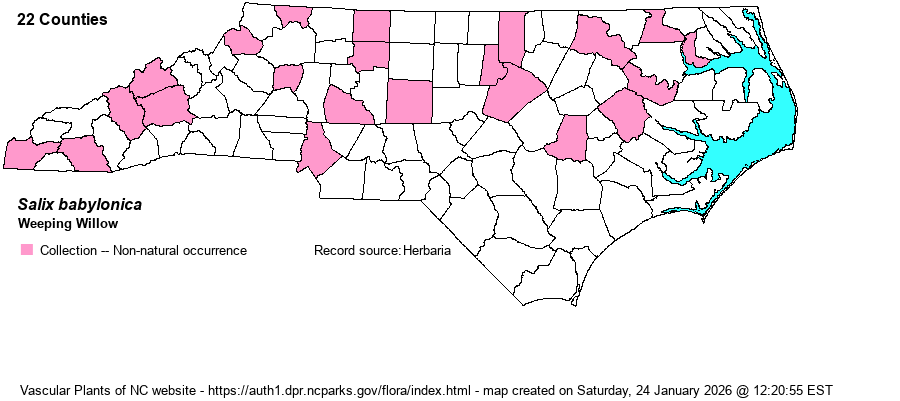| Author | L. | |
| Distribution | Scattered throughout, except no records of escapes in the Sandhills and southern Coastal Plain.
Native of Eurasia; in N.A. in the southeastern States and CA. | |
| Abundance | Uncommon as an escape, but frequently seen as a planting. | |
| Habitat | Lakesides, creeksides, marshes, roadsides, waste areas. | |
| Phenology | Flowering March-April. | |
| Identification | Weeping Willow, a very familiar planted tree in yards and near farm ponds, often grows to be a medium to large tree, with branches that characteristically arch near their base and then droop almost vertically (such that most leaves point towards the ground). Leaves are very narrow, glabrate and glaucescent beneath, margins finely toothed, the blade tapering to a long tip. | |
| Taxonomic Comments | The genus Salix is a very large and complex group of plants that vary from ground-hugging Arctic belly plants to huge trees. There are 113 species in North America alone, including introduced species. They are extremely important to browsing mammals -- rabbits, deer, elk, muskox, moose, many rodents -- and browsing birds like ptarmigan. Many birds use them to nest in. Here in NC we only have a small number of native species (5) and so do not appreciate the ecological importance of willows. We highly recommend reading the introductory pages of George Argus's FNA treatment (2010) and his excellent monograph on the willows of the southeastern U.S. (1986). The latter has drawings and descriptions of all southeastern U.S. taxa. Due to natural and horticultural hybridization, some plants will not key cleanly and you may have to compare your specimen with others verified by Argus. | |
| Other Common Name(s) | | |
| State Rank | SE | |
| Global Rank | GNR | |
| State Status | | |
| US Status | | |
| USACE-agcp | FACW link |
| USACE-emp | FACW link |

